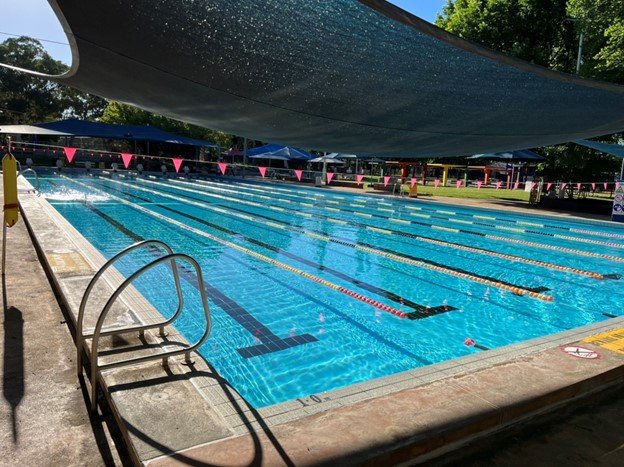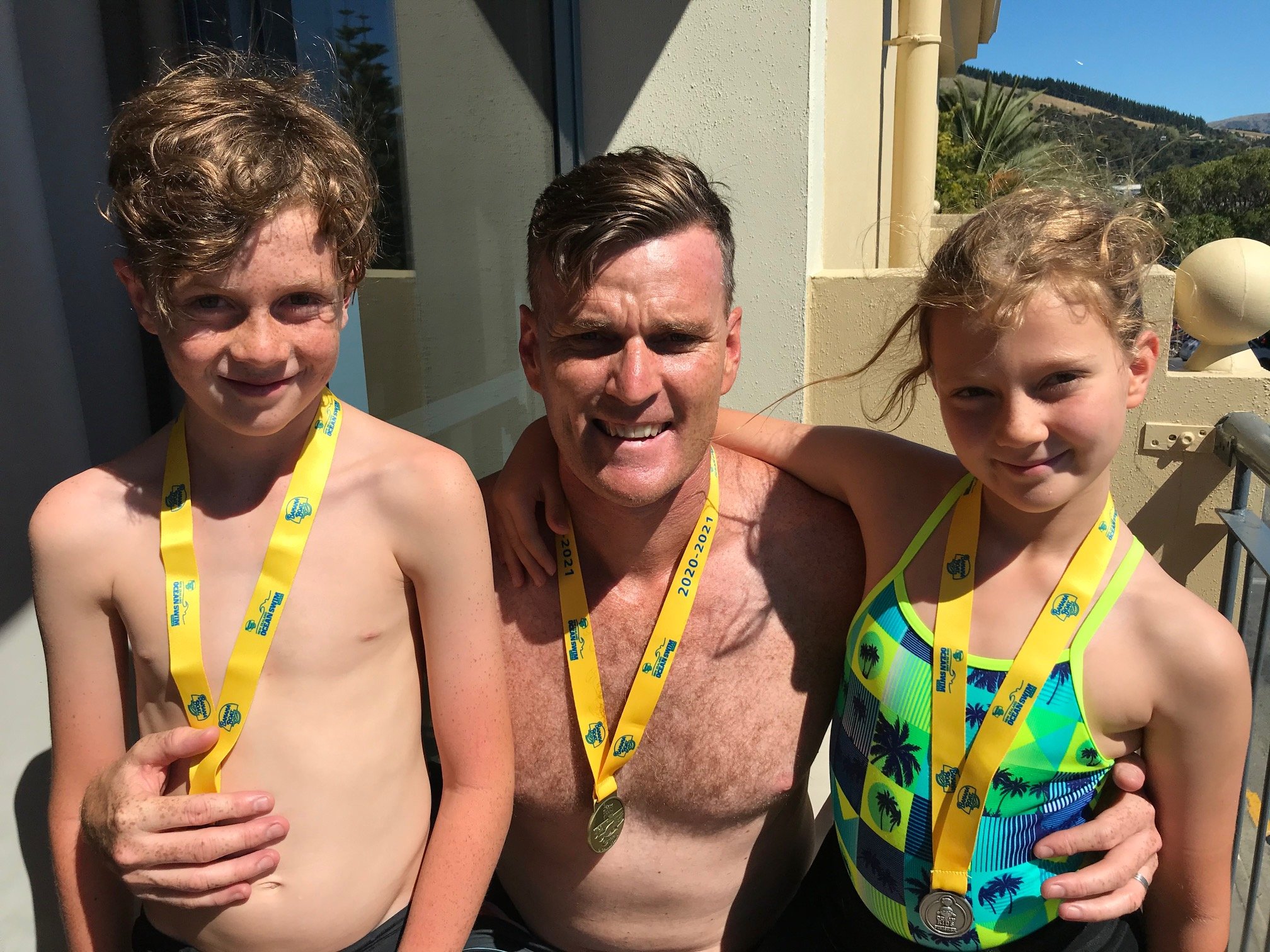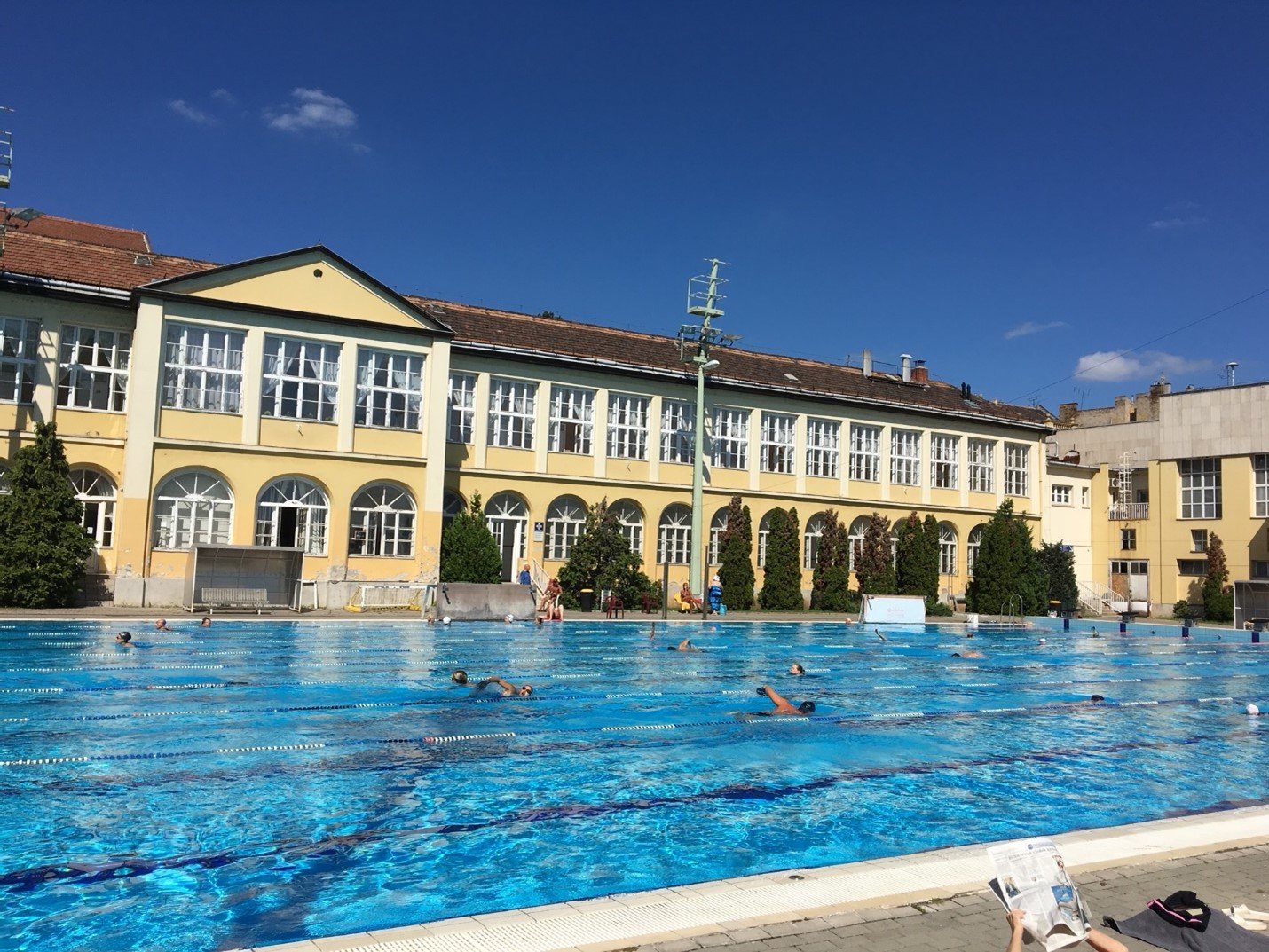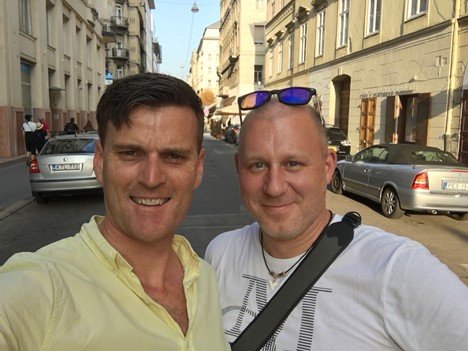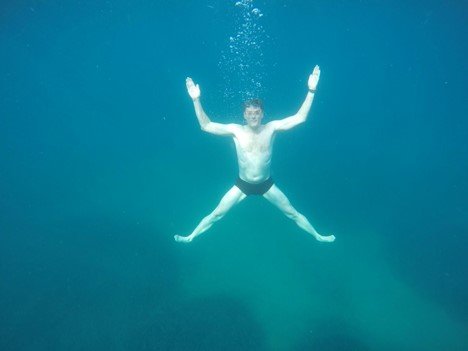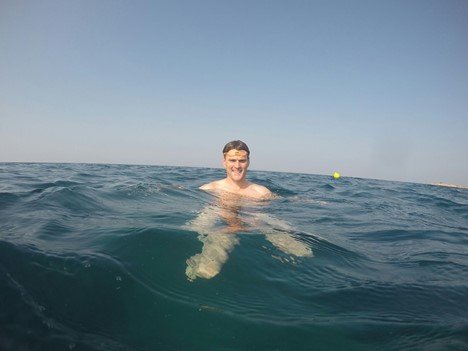Cam Boland - Canberra, Australia
Name: Cameron Boland Known as: Cam Age: 44
Lives in Canberra, Australia Occupation: Sport and Exercise Physiotherapist
Connect with Cam: IG
Cam, what 4-6 words best describe you?: Loyal, determined, fun, family, adventurous
Tell us about your swimming Cam.
“At the moment I manage to fit in two to three swims a week depending on family commitments. With two children playing multiple sports in addition to music lessons there are not many hours left in the day for mum and dad to get their fix in!
“This will increase to around five times a week when I am training for a particular event or series of events. For a 15–20 year period up until mid-2020 I hadn’t swum more than a handful of times, when I was persuaded to enter an open water swim. With no training my (predictably) poor result reignited a fire to get back in the water consistently.
“Since returning to the pool swimming consistently I’ve had some good results with winning my age group in the NZ Ocean series as well as finishing with a top 3 placing in my age for the FINA 2021 Masters World Rankings - 200m backstroke
“In early 2022 we moved back to Canberra, Australia, and I joined a water polo team which I am loving. It’s been a great way to supplement my swim sessions. The repeat efforts required in water polo have been great as a fun speed session, not to mention the addition of some much-needed hand eye co-ordination work!
“When I am swimming under my own direction I seem to consistently return to sessions which have me sitting at or just slower than what I perceive/estimate would be my current anaerobic threshold (AT). These sessions will typically be around 2000-3000m in total distance with the main set being 1000-1500m.
“I don’t get too creative in these sessions, so my main set (SCM) is usually something like:
· 15 x 100 holding 1.12-14 pace. Reps 1-5 on 1.25, reps 6-10 on 1.20, reps 11-15 on 1.25
· 5 x 200 holding 2.30 repeating on 2.45. Followed by 5 x 100 on 1.25 holding 1.10 pace
· 5 x (150/100/50) holding 1.15 pace and repeating on 1.30/100m cycle
“I’ll try and include some backstroke work in the above sets, trying to hold somewhere between 1.15-1.20/100m pace and repeating on 1.30/100m cycle.
“Recently I’ve joined in the coached swim sessions with a water polo team and have had some good fun there. I’ve enjoyed having someone else write the programs and, given the nature of water polo, we’ve been working on speed work with longer rest intervals than I’ll typically do.
“Sets like this seem to pop up and I’ve been enjoying the variety it provides:
4 x (2 x 100 on 1.50 holding quicker than 1.10 pace
2x 50 backstroke on 60 holding 35 seconds
100 easy)
“I have enjoyed the addition of this faster work with longer intervals and will be adding similar sets into the routine when I’m swimming on my own.”
Do you have a favourite set Cam?
“As far as swim sets go there have been some doozies across my swimming career and a few stand out (not sure if that makes them my favourite or not!).
“Swimming with Ken Wood (RIP) was an eye opener, and he had a particular knack for getting the most out of me. I recall one main set being: 10x400 on 6.00. Odds max effort, evens easy. You were allowed to touch and go after the hard 400, giving you a bit more time to swim easy/recover for the next effort.
“Swimming with Peter Freney in Canberra meant Saturday mornings were for “HR” sets. This was usually 24-30x100 repeating on 1.40 holding the fastest possible split you could manage. It was super rewarding to watch times come down over the months/years! I get the feeling this is where my love for working at, or around, AT came from!”
Tell us a little about your early years of swimming Cam.
“I’m not sure when I learnt to swim but suffice to say I have no memory of not being proficient at swimming. My very first coach was Mrs. Mary Woods at the Capital Swim Club in Canberra. I’m confident it was more play based than anything, but she was the one who convinced me it was a good idea to do my first swim meet.
“My absolute favourite early memories of competitive swimming were meets held at the Civic Pool in Canberra. An outdoor 7 lane pool with a diving pool next to it. Jumping off the diving towers all day between races (with parents having to drag you down to the pool for your race) and eating hot chips and ice cream in the sun all day long! I’ve no idea whether I swam well at these meets but it was just so much fun!”
Where do you swim Cam?
“At the moment I am swimming twice a week out of Canberra International Sports and Aquatic Centre (CISAC) http://www.cisac.com.au/ and once a week at the Civic Pool.
“When time permits during summer, I try to hit my favourite Canberra pool, the Dickson Aquatic Centre. Some of my fondest swimming memories come from this traditional outdoor 50m pool, with its grass surrounds particularly attractive.”
Photos below - left, Dickson Pool : right, proud dad with Oliver and Ella after a recent ocean swim event
Tell us about the relationship you have with swimming Cam.
“First and foremost, it’s the feeling of being in the water. It’s my home as far as exercise goes. It’s where I feel most comfortable, and most at ease when exercising. Certainly, swimming is where I most readily get a “flow state” happening.
“I never “fell out of love” with swimming, I just kind of fell away from it. I think I forced myself to believe that “those days” were behind me and there just wasn’t any point in getting back in the water. I think that attitude was reinforced by feeling terrible each time I got back in the water. With the benefit of hindsight I understand that it felt terrible because each time I went back to swim a few laps I wasn’t being consistent and allowing myself the time and fitness to get at least some of that “feel” back
“I would love to be able to have the “feel” I had more than 20 years ago but I’m not sure that will ever come back so I will have to be comfortable with feeling good in the water, but not great.”
Do you have any current goals for your swimming Cam?
“There are a couple of goals on the horizon if I get organised. I am keen to return to Masters swim meets. I’ve aged up to Masters this year and my swims from last year would have me setting Australian Masters age group records in a few events. It’d be cool to jag a couple of those records.
“I also have my eye on an open water swim in Fiji in May 2023. It looks amazing and would be a great little “swimcation”
What’s the best places where you’ve swum Cam?
I’m fortunate enough to have swum in a lot of pools, oceans, rivers, and lakes around the world. How do you qualify your ranking of a pool when you’ve swum in so many?! Perhaps it’s going to be easier if I narrow it down to a handful of pools and open water destinations.
Dickson pool (see earlier) is my favourite local pool. Not because the pool is amazing, but for the open layout, the grass embankments, and the host of amazing memories it has given me.
North Sydney Olympic Pool “If you want a world class view with your swim, it’s hard to go past this one.
Csaszar-Komjadi Sportuszoda (Budapest) “A beautiful pool in Budapest. This one comes from the privilege of travelling with Australian water polo teams as the team physio. This pool was the home of two Hungarian giants of swimming in Tamas Darnyi, and Kristina Egerzegi. (photo below - left)
Huka River, NZ “If you ever get the chance to do the Huka X-Stream swim do it. 3.2km downstream swim (I came in at 28:15 so it’s fast!) in crystal clear waters. By crystal clear I’m talking 4-5m deep in parts with 100% visibility to the bottom of the river. A breathtaking swim but make sure you finish at the finish line as the Huka falls are only a few kilometer’s further downstream!”
If a visitor came to Canberra where do you suggest they swim?
“Depends on the time of year. Late spring to early Autumn means heading to Dickson Pool. Over the colder months there are a few options, and it depends on what part of town you are staying in but I suggest heading to CISAC; a 10 lane 50m pool which is usually set as 2 x 25m pools. Compared to a lot of pools I’ve been to around the world it’s not too crowded and I haven’t had more than 2 people in a lane with me nearly every time I’ve swum there.
“A pool here in Canberra that has been built whilst I was living in New Zealand is Stromlo Leisure Centre. I’ve heard good things about the pool so will have to get there and try it out.“
Tell us about one of your proudest swimming achievements in your swimming to date Cam.
“There is one standout which I always return to and I’ll get to it but I feel I need to provide some background with some other swims in the years leading up.
“I started swimming competitively when I was aged five or six, and except for a one year hiatus when I was aged 13-14, I swam each year until I was 22-years old.
“While I loved the sport until about 15/16 years of age, it was sheer determination that kept me in the pool and not any kind of results.
“I still recall the swim – the 200m Backstroke as a 15-year old - when I achieved my first National Age Qualifying time. I was so proud of this result because I had come back to swimming after the one year off, worked my butt off with the goal of qualifying for the national meet. I went as expected at my first Nationals, finishing towards the back of the field in the 200m event.
“The following year (now 16), I managed to write off my season by dislocating my patella on the waterslides whilst away at a swim meet so didn’t get to head to Perth with the rest of my teammates having qualified in the 100m and 200m backstroke, the 200m and 400m IM and earnt a place on the club relay teams. By this stage I had started to see some rewards for the effort I was putting in.
“The following year was my redemption year. I was heading to my second (and last) Age Nationals as a 17-year-old, keen on making an ‘A’ final, and potentially jagging a medal in a relay (a theme that would carry on later in my swimming career).
“A big PB in the heat of the 200m backstroke saw me nab lane 8 in the A final and from there I think I finished around 6th in the final. A result I was super proud of given I had missed out on going to Age Nationals the year prior.
“As a bonus our club medley relay came from nowhere to pick up a bronze medal.
“These two results were the spring board my confidence needed and saw me drop 8 seconds from my 200m backstroke personal best over the next five-months, to the point I made my first Open Nationals ‘A’ final the same year.
“The next few years saw a mixed bag of results at Open Nationals, making a handful of ‘A’ finals in both the 200m backstroke and 400m IM but no “big results” to speak of.
“A lot of hard work without the reward I wanted.
“Which brings me to the result I am most proud of.
“By the time I was 21 I felt I had missed my window of opportunity to take my swimming to the next level and make a senior Australian swim team, so I was content to swim with an amazing club in Canberra with a view to helping and pushing some of the younger guys, finishing up my swimming career at the 2000 Olympic trials.
“Prior to the trials I identified we had an opportunity for myself and three other guys (ages 16-19) to surprise some people at the 1999 Australian Short Course titles which happened to be held in our home pool in Canberra at the Australian Institute of Sport.
“Six months out I sat the lads down and told them we had an opportunity to mix it with the big boys in the club 4x200 freestyle relay in our home pool in front of our family and friends.
“By the time Nationals rolled around I thought we had something special but was unsure of just how it would pan out. In my head I thought we had a ceiling of a medal, and a potential floor of missing out on the A final altogether!
“We managed to land Lane 6 in the final.
“All the teams ranked ahead of us, and a couple behind us, had some seriously big guns on their teams. By big I mean Ian Thorpe, Michael Klim, Grant Hackett. In 1999 big! And so we had tempered our expectations, but were quietly confident of pulling something out.
“To cut a long story short, we managed to swim approximately 20 seconds quicker than our PBs added up and finished with an amazing bronze medal.
“The Miami team who beat us consisted of Michael Klim, Grant Hackett, Dan Kowalski, and Stephen Penfold (3 Olympians on this team alone)
“The Aquadot team we beat out for bronze had Ian Thorpe and Craig Stevens (both Olympians) in it.
“When the end of year World Rankings were released the Miami team were in 1st place and our relay team of “nobodies” were in 9th place!
“This is by far and away the swim I am most proud of and I get the feeling the fact it was a relay amplified the emotions surrounding that swim.”
Has swimming changed your life Cam?
“I wouldn’t say it has changed my life. More so it has had a significant influence in shaping my life. While the easy option is to say swimming helps instill the sense of dedication, discipline, goal setting etc. I think I’d prefer to comment on the relationships it afforded me.
“Being a part of a larger group (squad) where everyone is goal oriented and working hard is an extraordinary experience that at 17 years of age you don’t fully comprehend just how much of a privilege it is. That period of 15-17 years of age was so important to me for the relationships I established. These are lifelong friendships with people whom I know I can call up and ask for help at the drop of a hat.
“Two examples spring to mind.
“A few years ago, I was having a professional challenge and I needed someone professionally neutral to help me through it. One of my teammates from when I was 15-17 years of age, who works in the same field as me, so, despite being many years since I last spoke to her I called her up and she was at my house the next day for a chat!
“In 2016 I was fortunate enough to be touring Europe with an Australian water polo team. When I noted I would be in Budapest for a few nights. I reached out to an old teammate, Marek (photo below, right) who lived in Slovakia on the off chance he might be able to make it to Budapest for a beer. Sure enough, there we were, 20 years since we’d shared a lane together, having beers and a laugh as though no time had passed!”
Cam, what are the key stroke technique points you often reference when swimming?
“First is head position and timing of breathing dictates body position.
“Head up equals hips down! I find that the most common breathing mistake is turning the head either too slowly or too late into the stroke. Fix head position and breathing and you’ll sort out a lot of issues.
“Second point is length at the catch and its relationship to body rotation.
“Reach out and roll with the arm to get that length, whilst ensuring you don’t over rotate and end up pulling across your body!. Whilst it all sounds very simple, I completely understand that to a novice it is extraordinarily complicated - particularly an adult novice.”
And to finish. Tell us a FUN FACT, or 2, about yourself?
“I don’t know whether it qualifies as a “fun fact” but a fact about me that was super exciting was being able to go to the 2021 Tokyo Olympics as a part of the support team (Physio) for the NZ Olympic Rowing Team. Being a part of the support team that helped the Men’s 8 win a Gold Medal was the most amazing sporting experience I’ve had the privilege to be a part of.” (photo below - Cam with Tom Mackintosh - 1-seat Gold medal Rowing 8 NZL crew)
Cam swimming in the Aegean Sea (above) and in an endless pool (below)


